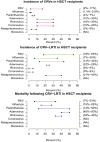Management of respiratory viral infections in hematopoietic cell transplant recipients
- PMID: 23226621
- PMCID: PMC3512176
Management of respiratory viral infections in hematopoietic cell transplant recipients
Abstract
Advances in stem cell transplantation procedures and the overall improvement in the clinical management of hematopoietic cell transplant (HCT) recipients over the past 2 decades have led to an increase in survival duration, in part owing to better strategies for prevention and treatment of post-transplant complications, including opportunistic infections. However, post-HCT infections remain a concern for HCT recipients, particularly infections caused by community respiratory viruses (CRVs), which can lead to significant morbidity and mortality. These viruses can potentially cause lower respiratory tract illness, which is associated with a higher mortality rate among HCT recipients. Clinical management of CRV infections in HCT recipients includes supportive care and antiviral therapy, especially in high-risk individuals, when available. Directed antiviral therapy is only available for influenza infections, where successful use of neuraminidase inhibitors (oseltamivir or zanamivir) and/or M2 inhibitors (amantadine or rimantadine) has been reported. Data on the successful use of ribavirin, with or without immunomodulators, for respiratory syncytial virus infections in HCT recipients has emerged over the past 2 decades but is still controversial at best because of a lack of randomized controlled trials. Because of the lack of directed antiviral therapy for most of these viruses, prevention should be emphasized for healthcare workers, patients, family, and friends and should include the promotion of the licensed inactivated influenza vaccine for HCT recipients, when indicated. In this review, we discuss the clinical management of respiratory viruses in this special patient population, focusing on commercially available antivirals, adjuvant therapy, and novel drugs under investigation, as well as on available means for prevention.
Keywords: HCT; RSV; adenovirus; antiviral therapy; cancer; immunocompromised host; infection prevention; influenza; metapneumovirus; parainfluenza; rhinovirus; transplant.
Figures
References
-
- Chemaly RF, Rathod DB, Couch R. Respiratory Viruses. In: Safdar A, editor. Principles and Practice of Cancer Infectious Diseases. USA: Humana Press; 2011. p. 371.
-
- Chemaly RF, Hanmod SS, Rathod DB, Ghantoji SS, Jiang Y, Doshi A, Vigil K, Adachi JA, Khoury AM, Tarrand J, Hosing C, Champlin R. The characteristics and outcomes of parainfluenza virus infections in 200 patients with leukemia or recipients of hematopoietic stem cell transplantation. Blood. 2012;119:2738–2745. - PubMed
-
- Chemaly RF, Ghosh S, Bodey GP, Rohatgi N, Safdar A, Keating MJ, Champlin RE, Aguilera EA, Tarrand JJ, Raad II. Respiratory viral infections in adults with hematologic malignancies and humanstem cell transplantation recipients: A retrospective study at a major cancer center. Medicine (Baltimore) 2006;85:278–287. - PubMed
LinkOut - more resources
Full Text Sources
Miscellaneous

